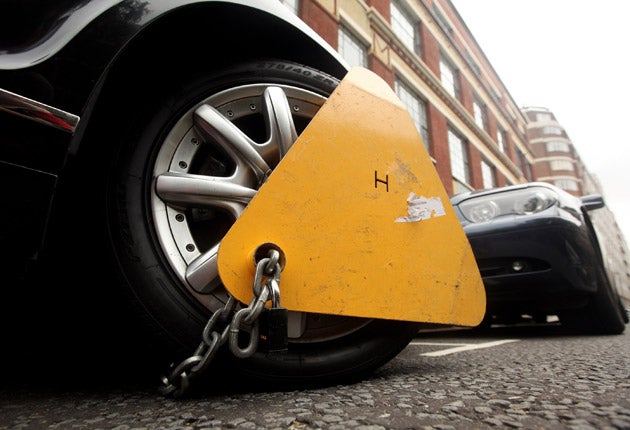Cowboy clampers pocket £55m a year

Cowboy clampers take up to £55 million from drivers every year, the Home Office said.
The figures, released as the Government takes steps to make wheel-clamping on private land a criminal offence from next year, back concerns that rogue operators were extorting millions of pounds from unsuspecting motorists.
But some critics, including the British Parking Association (BPA), criticised the Government for creating "a charter for the selfish parker", giving drivers the freedom to park wherever they want.
Home Office Minister Lynne Featherstone said: "For too long motorists have fallen victim to extortion and abuse from rogue clamping companies.
"I have been outraged by cases of drivers being frog-marched to cash points late at night or left stranded by rogue operators who have towed their vehicle away. Clearly this is unacceptable.
"By criminalising clamping and towing on private land this Government is committing rogue clampers to history and putting an end to intimidation and excessive charges once and for all."
Evidence from England and Wales showed around 500,000 clampings take place annually on private land with an average release fee of £112 and 98% of fees being paid as drivers want to get their vehicles back, the Home Office said.
In one case highlighted by campaigners last year, a nurse was clamped while visiting a patient and told to pay £350 for her car to be released.
For every hour she delayed payment, another £50 was added to the bill.
And another driver, Haroon Zafaryab, 27, said he stayed in his car for 30 hours to escape £4,000 of penalty tickets from a clamping firm and prevent his car being towed away.
Mr Zafaryab had all four wheels clamped in Wembley, north London, before he managed to agree a £100 release fee.
Previous efforts to curb unscrupulous clampers have failed and England and Wales are behind Scotland which introduced a ban nearly two decades ago.
The new measures will be introduced later this week in the Government's Protection of Freedoms Bill.
Once in force, the new law will mean only police or councils will be allowed to immobilise or remove a car in exceptional circumstances, such as a car blocking a road.
But motoring organisations have also warned about the rise of private operators issuing penalty tickets as they turn away from clamping.
Commenting on the forthcoming legislation, AA president Edmund King said: "This Bill is the first nail in the coffin of the cowboy clampers. These cowboys are soon to be outlawed criminals.
"We have always argued that motorists should not park where they like but believe that, in the 21st century, there are more humane ways to regulate parking."
He went on: "Partial licensing of clampers hasn't worked as it was used as a licence to print money so a ban is the only way out of this mess.
"One word of warning is that we are seeing evidence that some of the cowboys, drinking in the last-chance saloon, are increasing their clamping activity before the ban is introduced. So watch where you park.
"We would also like to see restrictions on the companies that issue bogus tickets on private land so that these cowboys are also driven out of town."
RAC Foundation director Professor Stephen Glaister said: "There are as many clampers now as there have ever been, with 1,816 people legally licensed to clamp. Add to that all those who don't even bother getting officially registered and you can see the scale of the problem.
"It is time for change but the legislation must set rules for those forms of enforcement which will replace clamping, such as ticketing.
"This needs to be joined-up thinking, not knee-jerk law-making which fails to drive unscrupulous operators out of business.
"Drivers should also be aware clamping will continue to be allowed on the public highway."
Join our commenting forum
Join thought-provoking conversations, follow other Independent readers and see their replies
Comments
Bookmark popover
Removed from bookmarks